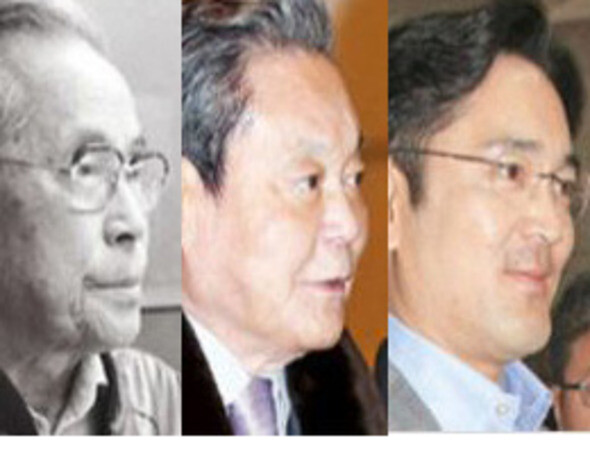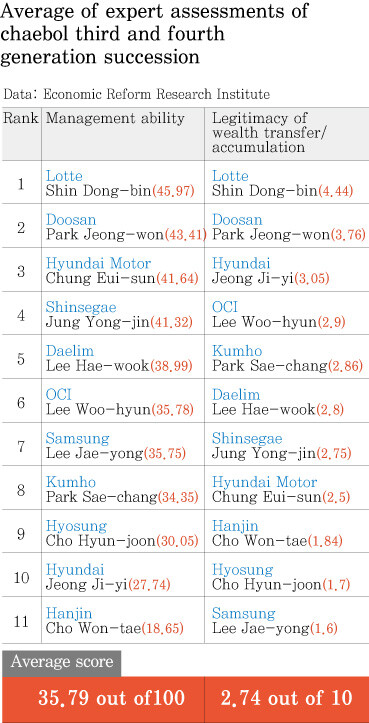hankyoreh
Links to other country sites 다른 나라 사이트 링크
Next chaebol generation gets failing grades for ability and legitimacy

The third and fourth generation family members who are taking over the reins at South Korea’s chaebols received failing marks in an assessment of management ability and legitimacy in wealth transfers and asset accumulation.
Lotte Group Korea chairman Shin Dong-bin ranked first in measures of management ability and legitimacy in wealth transfers. Korean Air Senior Vice President Cho Won-tae, whose older sister Hyun-ah was the central figure in the company’s recent “nut rage” scandal, received the lowest grade in management ability, while Samsung vice chairman Lee Jae-yong placed lowest for legitimacy of wealth transfers.

The ratings came in a report released on Mar. 30 by the Economic Reform Research Institute, headed by Korea University professor Kim Woo-chan. Titled “An Analysis of Management Rights Inheritance and Professional Perceptions for Chaebol Families,” it included a comprehensive assessment by 50 university professors, private institutes, and securities market experts on the process of third and fourth generation chaebol family members’ ownership transfers, management abilities, and ethics.
The ratings focused on eleven individuals: Lee Jae-yong at Samsung, Chung Eui-sun at Hyundai Motors, Shin Dong-bin at Lotte, Cho Won-tae at Hanjin, Park Jeong-won at Doosan, Chung Yong-jin at Shinsegae, Cho Hyun-joon at Hyosung, Chung Ji-yi at Hyundai, Lee Woo-hyun at OCI, Park Se-chang at Kumho, and Lee Hae-wook at Daelim. All are descendents of families designated by the Fair Trade Commission as large chaebol groups, and have five or more years of executive management experience.
Their average score for management ability was a failing 35.79 out of 100. The highest three scores were 45.9 for Shin, 43.4 for Doosan chairman Park Jeong-won, and 41.6 for Hyundai Motors vice chairman Chung Eui-sun.
Next in line were Shinsegae vice chairman Chung Yong-jin with 41.3, Daelim vice chairman and Lee Hae-wook with 38.9, OCI senior executive vice president Lee Woo-hyun with 35.78, Lee Jae-yong with 35.75, Kumho Tire vice president Park Se-chang with 34.3, Hyosung Group chairman Cho Hyun-joon with 30, and Hyundai senior managing director Chung Ji-yi with 27.7. Cho Won-tae at Hanjin placed last with 18.6 points.
The average score for legitimacy in the wealth transfer and asset accumulation processes by which they assumed management power was just 2.74 out of 10 points. Shin Dong-bin once again ranked first, with 4.44 points. The lowest score of 1.60 went to Lee Jae-yong at Samsung, who made billions of dollars from IPO profits with the issuance of convertible bonds for Cheil Industries (formerly Samsung Everland) and Samsung SDS at rock-bottom prices.
The experts were generally negative on the management rights transfer process as a whole. Fifty-six percent said the succession to the younger chaebol family generation was “undesirable” - four times the 14% who rated it favorably. Fifty-eight percent also said the succession had a negative impact on company values, or almost ten times the six percent who said the effect was positive.
“Lack of management ability” was the biggest issue cited in the succession process (36.7%), followed by “illegal or questionably legal inheritance of wealth” (30.8%).
“In the broad sense, South Korea’s chaebol could be classified as family enterprises of the kind found in many advanced economies,” said report author Wi Pyung-ryang on the chaebol’s management transfer process. “But there’s a clear difference in the way they’re structured and the way they operate.”
“We need to establish procedural legitimacy in the transmission process according to positive law and set in place a rational program for training future leaders,” Wi added.
By Kwak Jung-soo, business correspondent
Please direct questions or comments to [english@hani.co.kr]

Editorial・opinion
![[Editorial] Does Yoon think the Korean public is wrong? [Editorial] Does Yoon think the Korean public is wrong?](https://flexible.img.hani.co.kr/flexible/normal/500/300/imgdb/original/2024/0417/8517133419684774.jpg) [Editorial] Does Yoon think the Korean public is wrong?
[Editorial] Does Yoon think the Korean public is wrong?![[Editorial] As it bolsters its alliance with US, Japan must be accountable for past [Editorial] As it bolsters its alliance with US, Japan must be accountable for past](https://flexible.img.hani.co.kr/flexible/normal/500/300/imgdb/original/2024/0417/6817133413968321.jpg) [Editorial] As it bolsters its alliance with US, Japan must be accountable for past
[Editorial] As it bolsters its alliance with US, Japan must be accountable for past- [Guest essay] Amending the Constitution is Yoon’s key to leaving office in public’s good graces
- [Editorial] 10 years on, lessons of Sewol tragedy must never be forgotten
- [Column] A death blow to Korea’s prosecutor politics
- [Correspondent’s column] The US and the end of Japanese pacifism
- [Guest essay] How Korea turned its trainee doctors into monsters
- [Guest essay] As someone who helped forge Seoul-Moscow ties, their status today troubles me
- [Editorial] Koreans sent a loud and clear message to Yoon
- [Column] In Korea’s midterm elections, it’s time for accountability
Most viewed articles
- 1[Column] The clock is ticking for Korea’s first lady
- 2Samsung barricades office as unionized workers strike for better conditions
- 3[Editorial] When the choice is kids or career, Korea will never overcome birth rate woes
- 4Why Israel isn’t hitting Iran with immediate retaliation
- 5[News analysis] After elections, prosecutorial reform will likely make legislative agenda
- 6[Editorial] Does Yoon think the Korean public is wrong?
- 7S. Korea, Japan reaffirm commitment to strengthening trilateral ties with US
- 8[Editorial] As it bolsters its alliance with US, Japan must be accountable for past
- 9Japan officially says compensation of Korean forced laborers isn’t its responsibility
- 10Faith in the power of memory: Why these teens carry yellow ribbons for Sewol